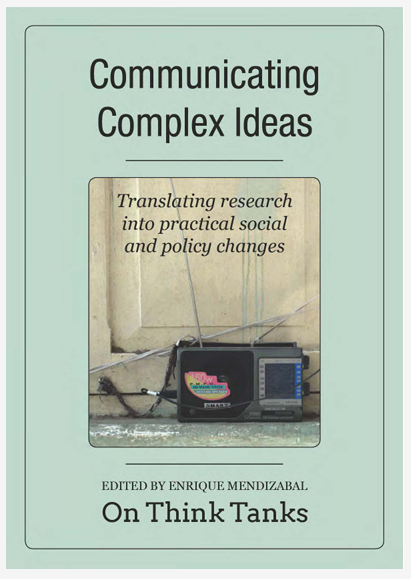Communicating Complex Ideas (2014) was written by authors from Latin America, Africa, the Middle East, and Asia. They explore the various challenges that researchers and communicators face when they work together to develop and communicate complex policy arguments.
In 2013 we began a series of posts on the challenges of communicating complex ideas. The aim of the series was to put together a book or volume that would allow researchers and communicators to engage in a dialogue about how to communicate.
The cases were produced over a period of about a year – some taking longer than others. The chapters were originally presented to the broader public via On Think Tanks. These posts outlined the main research questions that the authors would attempt to address in each chapter and shared some of their initial expectations and progress.
As the research process progressed, the authors shared draft versions and discussed their chapters with me over Skype as well as face to face with one of the Ecuadorian case authors at an international event in South Africa and during visits to Argentina and Indonesia over the course of 2012. These interactions and conversations presented opportunities to probe certain assumptions and focus the cases on issues and lessons that were emerging across the studies.
The cases present a new take on the ‘stories of change’ approach often used to show or illustrate how research impact on policy. Instead they offer an opportunity to reflect on the manner in which different elements or components of any effort to influence change come together and how two key participants, researchers and communicators, can support each other.
It took a while (I have been learning about publishing myself so it has taken more than expected. I apologise of any typos or mistakes… I hope the good ideas are good enough to keep us interested) but here is the book:
- Communicating Complex Ideas: Translating research into practical social and policy change (Full Book)

Or download each chapter:
- Advocating for electoral reform in Argentina by María Page, Julia Pomares, Laura Zommer and Dolores Arrieta
- From ‘communication as profession’ to ‘communication as being’ in Ecuador: the case of pesticide use by Stephen Sherwood, Myriam Paredes and Andrea Ordóñez
- School reform in the Middle East by Ted Purinton and Amir ElSawy
- Challenges of budget transparency and accountability in Indonesia by Muhammad Maulana and Bagus BT Saragih
- Social marketing in South Africa: the case of breastmilk by Shannon Kenny, Anna Coutsoudis and Patrick Kenny
- Conclusions: Shedding light on complex ideas by Goran Buldioski
It goes without saying that a big thanks goes to the authors and to Sherine Ghoneim and Shahira Emara at GDNet (and the Economic Research Forum in Cairo) who supported this initiative.
I leave you with a quote from Goran Buldioski’s excellent concluding chapter, that I think sums up what we all know about this subject -but are afraid to accept: Communicating complex ideas has never been easy. Nor will it ever be…

